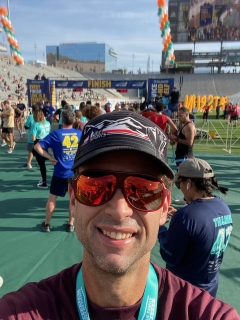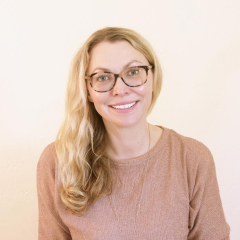ASU School of Human Evolution and Social Change welcomes 3 new faculty members
With the start of the new school year, the School of Human Evolution and Social Change, an academic unit of The College of Liberal Arts and Sciences at Arizona State University, has welcomed three new members to the school's faculty.
“We are very excited to add these three esteemed researchers and educators to our faculty,” said Chrsitopher Stojanowksi, director of the School of Human Evolution and Social Change. “Each of them brings a unique perspective and expertise to our school.”
Christopher Caseldine, assistant research professor
Caseldine is the collections manager for anthropological collections in the Center for Archaeology and Society at the School of Human Evolution and Social Change, and now joins the school as an assistant research professor for fall 2022.
“I have diverse research interests, including the Native American Graves Protection and Repatriation Act (NAGPRA),” Caseldine says. “The fall semester marks the beginning of the NAGPRA learning track – the only NAGPRA educational program in the United states. Students will learn the various steps necessary for NAGPRA compliance and they will learn about the background and wider implications of NAGPRA.”
Other areas of interest and research for Caseldine are ancient irrigation and Hohokam identity.
“I focus on Hohokam irrigation of the lower Salt River Valley where Arizona State University is located,” Caseldine says. “I'm particularly interested in the institutions and roles that the ancient farmers interacted with during the over a millennium of irrigation in the valley and which continue today.
“Hohokam — who are the ancestors of the Akimel O'Odham, Tohono O'odham, Hopi and Zuni — were commonly characterized as a single entity: red-on-buff pottery, large-scale irrigation, ball courts, marketplaces and so forth. However, people that ascribed to Hohokam identity did so differently across the Hohokam region consisting of the Phoenix Basin, Tucson Basin, Tonto Basin, Safford Basin and neighboring areas in Arizona. Even within the Phoenix Basin, which has been described as the core of the Hohokam world, there appears to be differences that may have been marked by irrigation system membership.”
Caseldine was a sergeant in the United States Marine Corps prior to starting his undergraduate studies. He also enjoys running.
“I picked up running last year after a hiatus, after reading the ASU News story ‘Running toward the pain cave,’” Caseldine says.
Caseldine received his doctorate in anthropology from Arizona State University.
India Schneider-Crease, assistant professor
Schneider-Crease was most recently a postdoctoral fellow at the Center for Evolution and Medicine and joins the School of Human Evolution and Social Change as an assistant professor.
“My research uses a One Health approach to test hypotheses about the ecology and evolution of infectious disease transmission in dynamic natural systems, using tools from ecology, epidemiology and immunology to understand and disrupt transmission,” Schneider-Crease says. “I work across systems, collaborating with other researchers and public health institutions on projects focusing on infectious disease in wildlife and humans.”
She is also co-director of the Kasanka Baboon Project in Kasanka National Park, Zambia, and a member of the Simien Mountains Gelada Project in the Simien Mountains National Park, Ethiopia.
“I also co-lead community and conservation projects in Ethiopia, and am currently working with the ASU chapter of Engineers Without Borders to support a small-scale recycling plant in Debark, Ethiopia, that will combat waste arising from wildlife tourism while offering additional sources of revenue in the community,” Schneider-Crease says.
Schneider-Crease received her doctorate in evolutionary anthropology from Duke University.
Helen Elizabeth Davis, assistant professor
Davis joins the School of Human Evolution and Social Change as an assistant professor in evolutionary anthropology. She is also joining the Institute of Human Origins as a research scientist.
“My research focuses on how learning content and transmission channels shape what, when and from whom children learn,” Davis says. “Specifically, I am interested in how one particular cultural institution, compulsory formal schooling, has shaped the human mind. To investigate these topics, I rely primarily on longitudinal, quasi- and natural-experiments in South America and Southern Africa."
Before joining ASU, Davis held a research associate position in Harvard's Department of Human Evolutionary Biology and a postdoctoral fellowship at the University of Utah. Davis received her doctorate in evolutionary anthropology from the University of New Mexico.
Top photo: Exterior of the School of Human Evolution and Social Change building on ASU's Tempe campus. Photo by Deanna Dent/ASU


